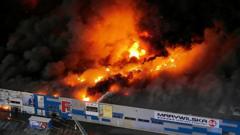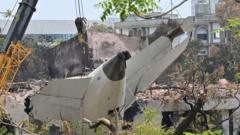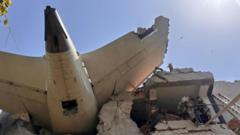Polish investigations conclude the 2024 arson at the Marywilska shopping centre was a strategic attack by Russian operatives, further escalating tensions between the two countries amid ongoing accusations of hybrid warfare.
**Poland Alleges Russian Intelligence Behind Warsaw Shopping Centre Blaze**

**Poland Alleges Russian Intelligence Behind Warsaw Shopping Centre Blaze**
Poland’s Prime Minister asserts Moscow orchestrated the fire that devastated a major shopping center in Warsaw, implicating Russian agents in a wave of sabotage.
In a significant escalation of accusations against Moscow, Poland has formally charged Russian intelligence services with being behind a massive arson attack that almost completely destroyed the Marywilska shopping centre in Warsaw last year. The incident, which took place in May 2024, devastated approximately 1,400 small businesses, many of which were run by members of the local Vietnamese community.
Poland's Prime Minister Donald Tusk made the claims via a post on X, stating that the nation possesses undeniable evidence that the fire was deliberately initiated by Russian special services. Tusk reported that some individuals involved in the arson are already in custody, while others identified as participants are still being pursued. Moscow has yet to respond to these fresh allegations, having previously dismissed charges of involvement in sabotage incidents across Europe.
Following a year-long investigation, Polish authorities announced their findings, highlighting that the blaze was coordinated by an unnamed individual located in Russia. In a joint declaration, Poland’s justice and interior ministers emphasized that the actions of those apprehended were part of a broader scheme orchestrated from within the Russian Federation. The two ministries also noted collaboration with Lithuanian officials, suggesting that some actors in the incident were involved in similar acts of sabotage within their territory.
The tensions between Poland and Russia have intensified since the latter’s large-scale invasion of Ukraine in 2022, leading to a surge in detentions and convictions over alleged sabotage connected to Russian intelligence. Polish officials characterize these events as elements of a "hybrid war" waged by Moscow—a form of warfare characterized by covert attacks designed to disrupt and undermine enemy infrastructure without direct attribution.
NATO has echoed these concerns regarding Russia's strategy of hybrid warfare in Europe, warning that such tactics are aimed at deterring Western nations from their ongoing military support for Ukraine. The alliance has found itself at odds with Moscow, which has repeatedly refuted claims of sabotage carried out by its secret services across the continent.
Earlier this year, Lithuanian prosecutors implicated Russia's military intelligence in an arson attack on a Vilnius Ikea branch, drawing a connection to the operations in Poland. Tusk reiterated that Lithuania’s findings supported Warsaw’s suspicions regarding a coordinated campaign of disruption.
The Marywilska shopping centre first opened its doors in 2010, but the fire resulted in numerous workers losing essential documents and significant amounts of cash stored there due to fears of theft at home. In response to these events, a temporary marketplace was quickly assembled by the shopping centre’s owners, allowing approximately 400 traders to resume their businesses shortly after the incident. A new, permanent shopping centre, Modlinska 6D, opened in October 2024, providing displaced traders a venue to continue their activities.
Poland's Prime Minister Donald Tusk made the claims via a post on X, stating that the nation possesses undeniable evidence that the fire was deliberately initiated by Russian special services. Tusk reported that some individuals involved in the arson are already in custody, while others identified as participants are still being pursued. Moscow has yet to respond to these fresh allegations, having previously dismissed charges of involvement in sabotage incidents across Europe.
Following a year-long investigation, Polish authorities announced their findings, highlighting that the blaze was coordinated by an unnamed individual located in Russia. In a joint declaration, Poland’s justice and interior ministers emphasized that the actions of those apprehended were part of a broader scheme orchestrated from within the Russian Federation. The two ministries also noted collaboration with Lithuanian officials, suggesting that some actors in the incident were involved in similar acts of sabotage within their territory.
The tensions between Poland and Russia have intensified since the latter’s large-scale invasion of Ukraine in 2022, leading to a surge in detentions and convictions over alleged sabotage connected to Russian intelligence. Polish officials characterize these events as elements of a "hybrid war" waged by Moscow—a form of warfare characterized by covert attacks designed to disrupt and undermine enemy infrastructure without direct attribution.
NATO has echoed these concerns regarding Russia's strategy of hybrid warfare in Europe, warning that such tactics are aimed at deterring Western nations from their ongoing military support for Ukraine. The alliance has found itself at odds with Moscow, which has repeatedly refuted claims of sabotage carried out by its secret services across the continent.
Earlier this year, Lithuanian prosecutors implicated Russia's military intelligence in an arson attack on a Vilnius Ikea branch, drawing a connection to the operations in Poland. Tusk reiterated that Lithuania’s findings supported Warsaw’s suspicions regarding a coordinated campaign of disruption.
The Marywilska shopping centre first opened its doors in 2010, but the fire resulted in numerous workers losing essential documents and significant amounts of cash stored there due to fears of theft at home. In response to these events, a temporary marketplace was quickly assembled by the shopping centre’s owners, allowing approximately 400 traders to resume their businesses shortly after the incident. A new, permanent shopping centre, Modlinska 6D, opened in October 2024, providing displaced traders a venue to continue their activities.



















